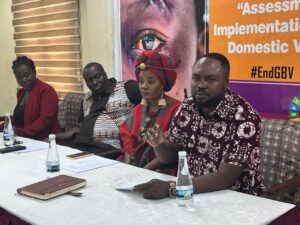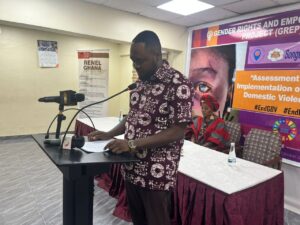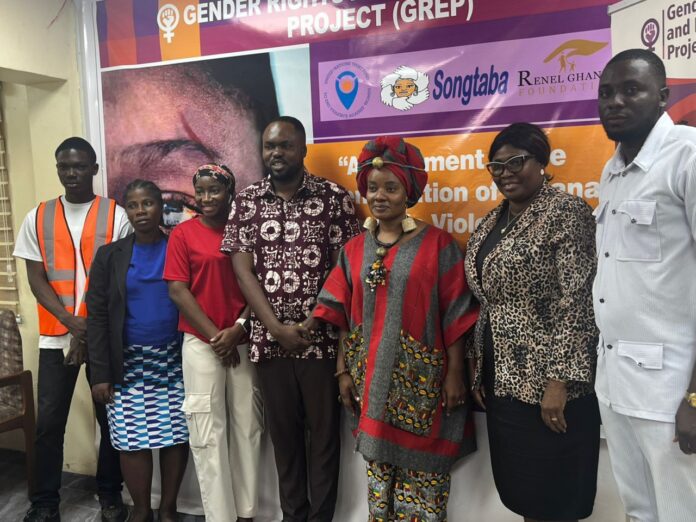Civil society organisations are calling on the government to urgently strengthen the implementation of Ghana’s Domestic Violence Act, 2007 (Act 732), and increase funding for the under-resourced Domestic Violence Victims Support Fund.
The appeal comes amid rising levels of gender-based violence (GBV) and growing concern over systemic failures that continue to leave survivors vulnerable.
The call was made at a press briefing in Accra organised by the Renel Ghana Foundation in collaboration with SONGTABA, with support from the UN Trust Fund to End Violence Against Women.

The event brought together stakeholders, advocates, and survivors who shared firsthand accounts of the realities of domestic abuse in Ghana.
“We cannot let a law meant to protect lives remain a promise on paper,” said Nelson Richardson-Mandela, Executive Director of Renel Ghana Foundation.
“The Domestic Violence Act must become a living instrument—one that offers safety, dignity, and justice to every survivor.”
Drawing on data from the Gender Rights and Empowerment Project (G-REP) and other research, the Foundation presented a stark picture of the GBV crisis:
-
The 2022 Ghana Demographic and Health Survey reported intimate partner violence (IPV) prevalence rates of 53.4% in the Savannah Region and 44% in the Central Region.
-
Over 1,000 elderly women in northern Ghana have been banished to so-called “witch camps.” A 2022 SONGTABA study found that 52.7% suffer from depression and 97% experience extremely low quality of life.
According to the Foundation, these figures highlight the devastating human cost of delayed action and chronic underinvestment in survivor services.

Despite the existence of Act 732, survivors of domestic violence continue to face major obstacles, including:
-
Underfunded support systems: The Domestic Violence Victims Support Fund remains largely inactive, limiting access to healthcare, shelter, and legal aid.
-
Institutional gaps: Police officers and social workers often lack trauma-informed training, while the Domestic Violence Management Board struggles with weak technical capacity and leadership.
-
Lack of public awareness: Many frontline workers remain unaware of protective mechanisms such as protection orders.
-
Cultural stigma: Patriarchal norms and fear of ostracism prevent many victims from reporting abuse.
Agnes Popolampo, a survivor of gender-based violence, encouraged others not to remain silent:
“Speaking out saved my life. I want others to know they are not alone.”
The Foundation also highlighted successes from the G-REP initiative, which is piloting one-stop support centers in districts such as Ada East, Ekumfi, Yendi, Gushegu, Nanumba, and East Mamprusi. These centers provide survivors with counseling, medical care, and legal aid in one location.
“We’ve seen clear evidence that this model works,” said researcher Benjamin Abaidoo.
“It shortens response time and ensures that survivors get comprehensive support without navigating multiple broken systems.”
Renel Ghana Foundation is therefore calling for bold and coordinated policy action to make the Domestic Violence Act fully functional. Their demands include:
-
Increasing budgetary allocation to the Domestic Violence Victims Support Fund.
-
Institutionalising continuous training for police, social workers, and the judiciary on survivor-centered approaches.
-
Strengthening oversight bodies like the Domestic Violence Management Board.
-
Scaling the one-stop center model nationwide.
-
Launching awareness campaigns to dismantle stigma and inform communities about legal protections.
“Every delay endangers another life,” Nelson Richardson-Mandela stressed.
“Survivors can no longer wait for the system to catch up. Parliament, ministries, local authorities, and civil society must act now—together.”
He added that while the law is a necessary foundation, it must be backed by political will, resources, and societal change to truly protect women and girls across Ghana.
The organisations behind the call urged all stakeholders to work collectively to turn the Domestic Violence Act from a legislative promise into a practical shield of protection and empowerment.
Source: Kodwo Mensah Aboroampa



